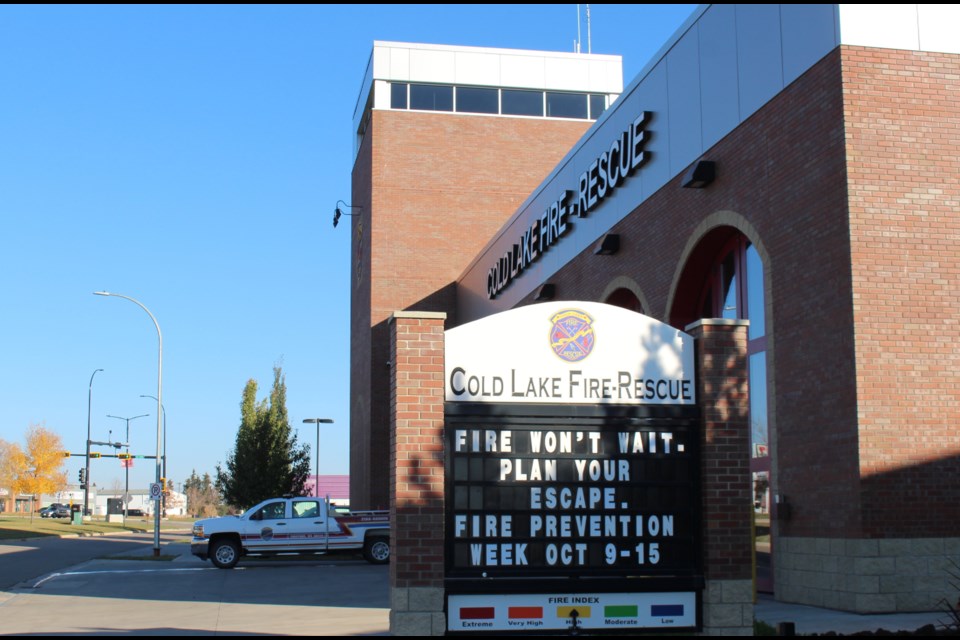COLD LAKE – People generally don’t like discussing worst case scenarios, especially not with the young children. But, having conversations and planning emergency drills could save valuable time and even lives when it comes to unforeseen disasters.
Oct. 9-15 is Fire Prevention Week and fire chiefs across the Lakeland and province are finding unique ways to educate the public on fire prevention, while driving home this year’s theme “Fire won’t wait. Plan your escape.”
The message is simple enough, yet many may not take its meaning to heart.
Cold Lake Fire-Rescue Deputy Fire Chief Norm Hollis says families should take time to discuss exit strategies from their home in case of an emergency. This, he says, could be done while sharing a meal.
Since 2015, Hollis has been the Fire Prevention Officer for the Cold Lake fire department. His role with the department involves public awareness campaigns, youth education and community fire preparedness support.
“Fire can happen at any time. It doesn't say ‘Well, here's your notice. You'll have it at 10 O'clock tomorrow morning.’ So, plan for it because it can happen at any time,” he said.
“When you're sitting at the dinner table and everyone's finished supper, say ‘OK, we're going to do a fire drill right now.’ What happens if there's a fire here? Who is going to grab the leash and the dog? Who is going to grab the cat and put him in the cage.”
While adults may have a subconscious plan of escape and are aware of their home's layout, kids may not, he says.
“During an emergency, when anxieties are high kids get scared and these things take longer to figure out.”
Some important topics to cover during a drill include where the meeting point will be in case of an emergency, what are the exit points to get out of the home, and if the location of the fire changes how will you adapt.
Hollis points out that everyone should be aware that as they leave a house that is involved in fire, doors and windows should be closed behind them as they exit to slow down the movement of the fire. Doors should never be locked, however, as it will create an additional obstacle for responding firefighters.
Open House at Cold Lake’s Fire Halls
On Tuesday, Oct. 11, both Cold Lake Fire-Rescue Halls, north and south, will be hosting an Open House from 6 to 8 p.m.
The public event will include a barbecue and will give community members a chance to tour the facilities, get to know their local firefighters and ask questions.
“I always tell parents, don’t be afraid to ask us questions, that's what we're here for,” said Hollis. “It's an open front door, if they have questions they can come in (and) ask us about extinguishers, smoke detectors, carbon monoxide detectors, anything.”
Technology is always advancing and so are the ways to detect and warn occupants of a fire, especially for those that may have impairments or mobility issues.
"New items are coming online now for smoke detectors with strobe lights in them and also vibrating (alarms) for people that have hearing and sight impairments. You actually put this vibrating device under your pillow so if the smoke detector goes off, the device goes off and it wakes you up,” Hollis explained.
The fire department also offers home and workplace inspections.
“We'll come in, just do a quick walk around. Give extra ideas for how they can prepare themselves, like having the extinguisher in the kitchen, having an extinguisher near a gas fireplace or wood burning fireplace, stuff like that,” he said.
For households with individuals with mobility concerns, fire-rescue members can assist them with doing egress ideas, for exiting the home during an emergency.
Expiration dates are serious
While some may ignore the expiration date on their box of crackers, Deputy Fire Chief Hollis says the expiration date on smoke and carbon monoxide detectors should never be ignored.
“The detection systems do degrade after time,” he emphasized. “Some degrade quicker than others, but that is indicated by the device's lifespan.”
Most smoke detectors and carbon monoxide detectors are only certified for 10 years before they must be replaced.
“You'd be surprised how many calls we have had where an individual smoke detector or carbon monoxide detector was sounding because it was over aged,” he added.
Another important factor to consider for a detector's life span is if occupants vape or smoke in their house.
Hollis said this is because the oils from vaping and smoking will rise and begin coating the device’s detecting surfaces, which can affect the detectors’ efficacy.



